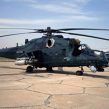
Azerbaijan’s Military Exercises in the Caspian: Who Is the Target?
Publication: Eurasia Daily Monitor Volume: 9 Issue: 94
By:

In mid-April, Azerbaijan’s State Border Service (SBS) reported on the successful completion of week-long tactical exercises in the Azerbaijani sector of the Caspian Sea. The exercises, called “Protection of Oil and Gas Fields, Platforms, and Export Pipelines,” involved around 1,200 servicemen, 21 ships, 20 speedboats as well as eight helicopters (Defence.az, April 18). High-ranking military officials including SBS head, General-Lieutenant Elchin Gulyev, and Minister of Defense Safar Abiyev launched and attended the events. The exercises were conducted in three stages and nine tactical tasks were implemented. The first stage involved neutralizing a conventional terrorist group. The group was eliminated with the help of the Igla anti-aircraft missile system. This suggests that the terrorist group was using a helicopter or other aircraft (Contact.az, April 18). The second stage involved helicopters and ships which monitored the designated area, and located and destroyed an enemy submarine. The last stage envisioned stopping ships that did not respond to inquiries; sending marines aboard the ships; and then searching for and locating explosives, drugs and components of weapons of mass destruction. Besides the above-mentioned arms and equipment, the exercise used anti-aircraft rocket launchers, heavy machine guns and various missile systems (APA, April 18).
This is not the first time Azerbaijan has conducted military exercises in the Caspian Sea. However, the character of these exercises suggested that Azerbaijan is seriously worried about the security of its vital infrastructure in the Caspian. Events preceding the April 2012 exercises, such as a deterioration of relations with Iran as well as Baku’s quest to become a transit territory for a Trans-Caspian gas pipeline from Turkmenistan to Europe, may be a prelude for such high-scale exercises.
First, the nature of Azerbaijani military exercises suggested that actions are directed against an enemy possessing a helicopter, a ship and even a submarine. It is hard to imagine that certain terrorist group would be able to acquire such arms or equipment, especially when taking into consideration the fact that the Caspian Sea does not have direct access to open waters. Recent information leaks regarding an Azerbaijani-Israeli arms deal worth $1.5 billion revealed that Baku had purchased Israeli made Gabriel-5 anti-ship missiles (News.az, March 29). This raises the question: which Caspian neighbor is Azerbaijan most worried about? So far, Azerbaijan had only one small incident in the Caspian Sea. In 2000, an Iranian naval ship refused to allow an Azerbaijani exploration vessel to begin working on oil fields in the southern Caspian. The Iranian side claimed that Baku was violating Iranian territorial waters. A lack of serious arms and equipment and an unwillingness to escalate the conflict did not allow Azerbaijan to continue exploration of the “disputed” oilfield. Yuriy Bondar, a Russian military expert with the Russian-based Middle East Institute, believes that both US and Israeli assistance to Azerbaijan would likely allow Baku to push back against Tehran and regain control of areas that Iran considers “disputed” (Golos Rossii, April 20).
Also of note are Iranian actions for the last couple of years. Iranian naval forces formed the Third United Military District to oversee the Caspian Sea. The district includes divisions of the Navy, Army and the Corps of Guardians of the Islamic Revolution. Furthermore, the Third United Military District is equipped with Sana-type speed-boats, a small submarine armed with torpedoes as well as the Sabehat-15 mini-submarine, used for intelligence gathering and subversive actions (Golos Rossii, April 20).
Baku’s northern neighbor also did not ignore Azerbaijani military exercises. The exercises coincided with news distributed by the Russian media that Russian ships were to be deployed to the Caspian Sea’s operationally important areas. Colonel Igor Gorbul, the head of the press service of the Southern Military District, told Interfax on April 17 that a group of Caspian Flotilla vessels comprising the Astrakhan small artillery ship and support ships was completing preparations for Caspian Sea maneuvers. The exercise’s main aim was a showing of the flag and to display the Russian Federation’s naval prowess ensuring a Russian Naval presence in the Caspian Sea’s operationally important areas (Interfax, April 17). He added that other tasks included the protection of Russian shipping and oil production facilities at sea from potential threats and monitoring the extraction of hydrocarbons and bio resources.
Russian authorities are extremely worried about recent energy developments in the Caspian, which boosted the prospects for a Trans-Caspian pipeline from Turkmenistan via Azerbaijan to Turkey and further to Europe. Although Azerbaijan clearly stated that it would serve only as a transit country, Moscow has been trying to put pressure on both Ashgabat and Baku using these types of naval military exercises. On May 5, the Russian Navy’s Caspian forces conducted missiles launches using the recently installed Bal-E system. Anti-ship missiles successfully hit the conditional target located 50 kilometers away from the launch site in the Caspian Sea. A day earlier, “Tatarstan,” the flagship of the Russian Caspian Navy, also implemented missile launches in the Caspian Sea. Russia’s Caspian Flotilla plans to receive the small artillery ships Makhachkala and Volgodonsk as well as the missile ship Dagestan by the end of the year. Overall, 16 new ships will become part of the Russian Navy in the Caspian Sea by 2020 (Komsomolskaya Pravda, May 5).
The recent naval exercises by Azerbaijan and Russia suggest that Caspian littoral states continue to strengthen their military capacities in the area. So far, only Russia, Iran and Azerbaijan have the capacity to protect their claimed Caspian Sea areas. If Kazakhstan and Turkmenistan begin bolstering their own naval and coastal defense capabilities, however, a true militarization of the Caspian Sea could become inevitable.




